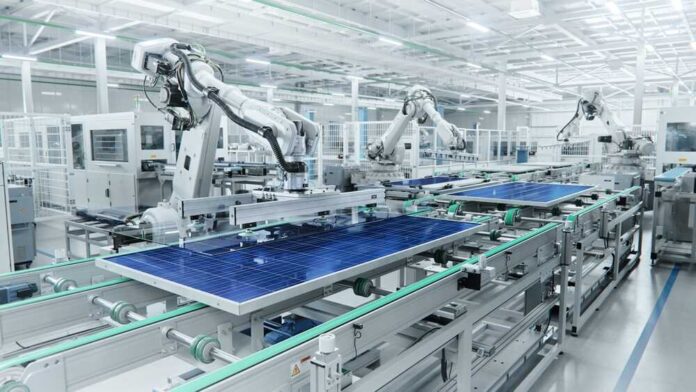
On Friday, the GOP-led House passed a bipartisan resolution to reinstate tariffs on solar panel imports. The vote concluded at 221-201, with 12 Democrats joining a majority of Republicans. At the same time, eight House Republicans sided with the majority of Democrats. This bill aims to protect American industries from China’s unfair market practices and to hold them accountable.
We must show the world that there will be accountability for countries that engage in unfair trade practices.
Today, the House reversed the Biden Administration's deeply misguided decision to give China a free pass on solar imports for two years. pic.twitter.com/F2MDmR0IwJ
— Rep. Jason Smith (@RepJasonSmith) April 28, 2023
Rep. Jason Smith (R-MO), House Ways and Means Committee Chairman, celebrated the passage, stating on Twitter that President Biden’s moratorium on solar panel tariffs has been giving China a “free pass” on solar panel imports for the past two years.
The bill now faces a challenging path in the Democrat-controlled Senate. Still, its bipartisan support in the lower chamber suggests it has a possibility of passage. However, the White House has warned that Biden would veto such legislation if it reached his desk.
Biden will veto bipartisan legislation that would reverse a rule allowing Chinese solar panel producers to avoid tariffs.
This is an anti-American business, pro-China president.
— Sen. Marsha Blackburn (@MarshaBlackburn) April 25, 2023
Last year, Biden issued a moratorium on solar panel tariffs for four Southeast Asian countries, including Thailand, Vietnam, Malaysia, and Cambodia, despite these nations housing Chinese-owned manufacturing plants. Lawmakers argued that this move could allow China to dodge U.S. trade laws, giving them an unfair advantage.
The House passed a measure to reimpose tariffs on Chinese solar panels paused by the Biden administration, dealing a bipartisan blow to the president in an effort to crack down on a foreign adversary.
The legislation is expected to easily clear the Senatehttps://t.co/JhMb8umYnP
— Ramsey Touchberry (@ramsberry1) April 28, 2023
The House vote would overturn Biden’s action that paused threatened tariffs, causing delays or cancellations of hundreds of solar projects across the United States. The U.S. solar industry has argued that solar panel imports are necessary to meet the increased demand for renewable energy. In addition, solar power is vital to Biden’s goal to achieve 100% clean electricity by 2035.
Supporters of reinstating the tariffs believe this action would hold China accountable and protect U.S. jobs and workers from unfair competition. However, China has been known to subsidize its panels and sell them at low prices, undercutting American manufacturers.
Opponents of the tariffs argue that reinstating them would harm the U.S. solar industry and hinder progress toward climate goals. Rep. Earl Blumenauer, a Democrat from Oregon, stated that the House action would “punish U.S. workers” and negatively impact the solar industry. Rep. Judy Chu, a Democrat from California, said that the two-year pause was “not a perfect solution” but provided “a short-term bridge” for the U.S. solar industry to produce more solar panels domestically.
White House staffers have defended Biden’s action, claiming it boosted an industry crucial to his climate change-fighting goals without interfering with the ongoing Commerce investigation. However, Biden has said he does not intend to extend the tariff suspension when it expires in June 2024.
While some industry groups argue that the House proposal and its retroactive tariffs would devastate U.S. solar deployment, others, such as the Coalition for a Prosperous America, have applauded the House vote. This lobbying group, representing domestic manufacturers, farmers, ranchers, and labor organizations, believes reinstating tariffs would protect American industries and workers from China’s trade violations.
As the bill heads to the Senate, its fate remains uncertain. However, the outcome of this legislation could significantly impact the U.S. solar industry, job market, and progress toward clean energy goals.



























